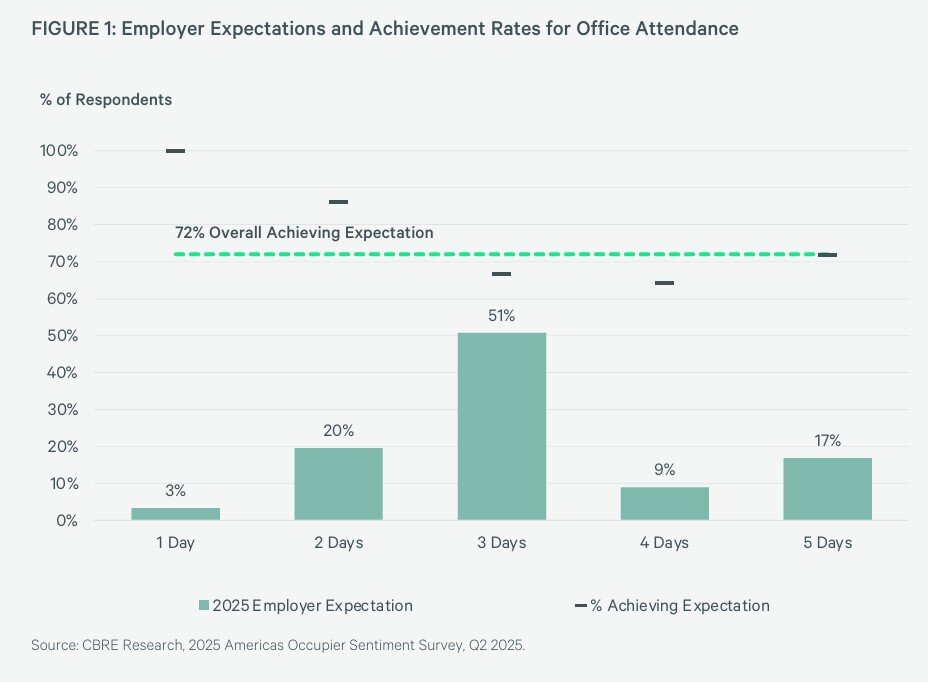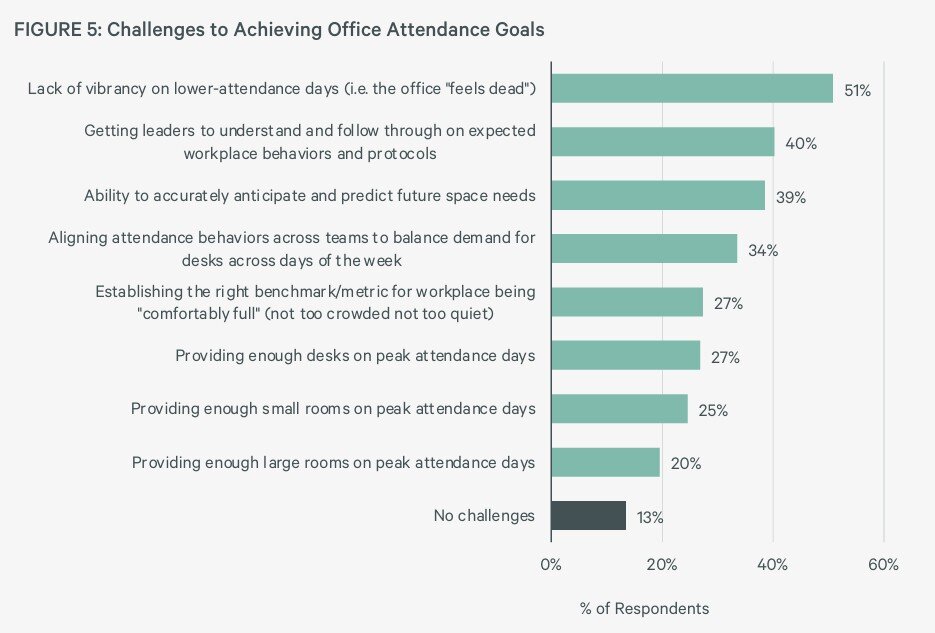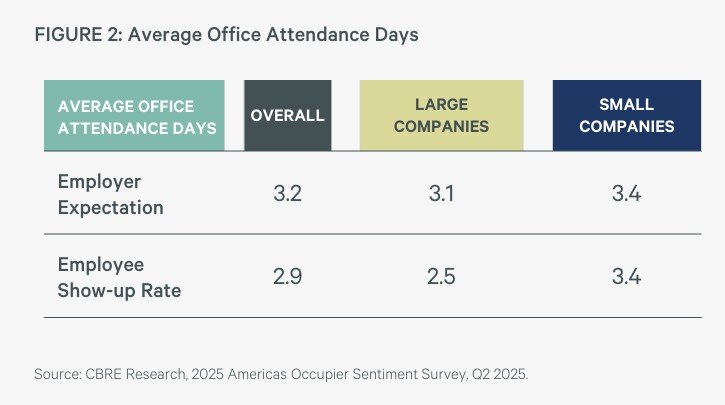Commercial Real Estate News

Employee Back-to-Office Attendance Surges in U.S.
Commercial News » New York City Edition | By Michael Gerrity | August 12, 2025 8:45 AM ET
But Still Falls Short of Pre-Pandemic Norms
Global property consultant CBRE reports U.S. businesses are making significant progress in getting employees back to the office and enforcing attendance policies, moving closer to establishing stable work routines that have eluded many since the pandemic reshaped workplace norms in 2020.
CBRE's latest 2025 Americas Office Occupier Sentiment Survey reveals that 72% of the 184 companies surveyed say they have successfully met their office attendance targets--a marked rise from 61% last year. The share of companies actively tracking attendance jumped to 69% from 45%, while those enforcing attendance rules more than doubled, climbing to 37% from 17% over the past year.
"After five years of adjusting to hybrid models, organizations and employees are finally finding common ground on when and how often to come into the office," said Manish Kashyap, CBRE's Global President of Leasing. "This alignment brings greater clarity that helps companies optimize operations and plan their real estate needs with more confidence."
Despite this progress, office presence still falls short of pre-pandemic levels. Companies reported wanting employees onsite about 3.2 days a week on average, while actual attendance averages 2.9 days.
With clearer attendance expectations, many firms are reconsidering their real estate footprints. Around 67% say they plan to maintain or grow their office space in the next three years, up from 64% last year. The proportion expecting to reduce space dropped to 33%, down from 36% last year and a steep 53% in 2023. Growth in business or headcount was cited by 83% of respondents as the main reason for expanding office space.
Julie Whelan, CBRE's Global Head of Occupier Research, noted that "the office remains essential but has evolved. Many companies now favor smaller, more efficient spaces designed for collaboration and employee experience, with an increased focus on seat sharing and the vibrancy of surrounding neighborhoods."
As hybrid work arrangements solidify, the survey signals that companies are embracing a more nuanced approach to office space--balancing employee flexibility with a renewed commitment to collaboration and workplace quality.
Other key findings from the survey, conducted from March to May 2025, include:
- Lease renewals remain popular, with 86% of firms planning to renew leases upon expiration, down slightly from 92% last year. Lease renewals now account for roughly 40% of leasing activity, compared to 30% before the pandemic.
- Employee convenience is a major factor in office location and amenities decisions. The most sought-after features are proximity to public transit (53%) and parking availability (52%), followed by food and beverage options (39%), indoor air quality (35%), and sustainability features (26%).
- Nearly half of companies expressed concern about the availability of high-quality office space over the next three years, especially prime locations, which make up only 8% of total inventory and have notably low vacancy rates.
- The flexible office sector is poised for steady growth, with small businesses increasingly adopting flex space and larger companies expanding their flexible workspace usage gradually over the next two years.
Sign Up Free | The WPJ Weekly Newsletter
Relevant real estate news.
Actionable market intelligence.
Right to your inbox every week.
Real Estate Listings Showcase
Related News Stories
Commercial Real Estate Headlines
- Commercial Property Investors Poised to Increase Allocations in 2026
- U.S. Commercial Mortgage Debt Climbs Toward $5 Trillion
- AI Sparks a Global $3 Trillion Data Center Supercycle
- AI Rewrites Playbook for Global Property Dealmakers, Says PwC
- Hong Kong's Central Office Market Enjoys First Rent Increase Since 2022
- U.S. Commercial Real Estate Lending Spikes in Q3
- Commercial Lending Surges in America
- North America Real Estate Enters a Tech-Driven, Boomers-Fueled Era in 2026
- U.S. Commercial Mortgage Delinquencies Ease in Q3
- Rents Hit 18-Year High in Tokyo as Japan's Office Market Defies Gravity
- Hong Kong Office Market Rebounds, IPO Activity Spurs Leasing Demand
- Poland's Commercial Markets Enjoy Rising Property Investment Activity
- Asia-Pacific Property Markets Show Signs of Revival as Investment Rises
- World Property Ventures Raising Capital to Digitize the Global Real Estate Economy
- U.S. Data Center Boom Tests Power Grid as AI Demand Outpaces Supply
- Commercial, Multifamily Mortgage Debt Climbs to Record $4.88 Trillion in U.S.
- U.S. Commercial Mortgage Delinquencies Rise in Q2, CMBS Loans Lead the Surge
- Tokenization-Focused Real Estate Investment Bank Announced
- Commercial Cap Rates Edge Lower in U.S., Hinting at Market Turn
- WPV Targets New $6 Trillion Digital Real Estate Tokenization Opportunity
- $1 Trillion in Data Center Development Underway Through 2030
- WORLD PROPERTY VENTURES: The 'Anti-VC' of Real Estate Plans Major Capital Raise
- Multifamily Sector Enjoys Record Absorption in U.S. as Supply Slows, Vacancies Drop
- Employee Back-to-Office Attendance Surges in U.S.
- Phnom Penh Commercial Property Sectors Face Crosswinds in 2025
- World Property Bank Announced to Capitalize on Coming Trillion-Dollar Tokenization Boom
- REAL ESTATE PREDICTIONS: Decentralized Events Contract Exchange in Development
- U.S. Architecture Billings Improve Slightly in May
- Tokyo Office Demand Spills into Non-Core Wards in 2025
- AI Hyperscalers Drive Record Data Center Leasing in Early 2025
- Commercial, Multifamily Mortgage Debt in U.S. Hits Record $4.81 Trillion in Early 2025
- U.S. Multifamily Market Rebounds in Early 2025
- U.S. Office Market Experiences Historic Conversion Shift
- New York City Enters New Era of Office-to-Residential Conversions
- World Property Ventures Plans New Capital Raise
- U.S. Commercial Real Estate Lending Rebounds Sharply in Early 2025
- U.S. Multifamily Housing Confidence Declines in Early 2025
- Asia Pacific Commercial Investment Holds Steady in Early 2025
- Carnival Plans New Miami Headquarters Spanning Over 600,000 Square Feet
- Hong Kong Property Investors Take a Wait-and-See Approach Due to U.S. Tariffs










